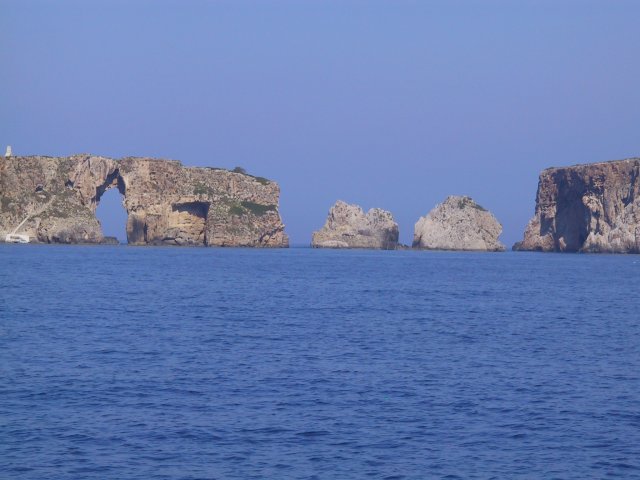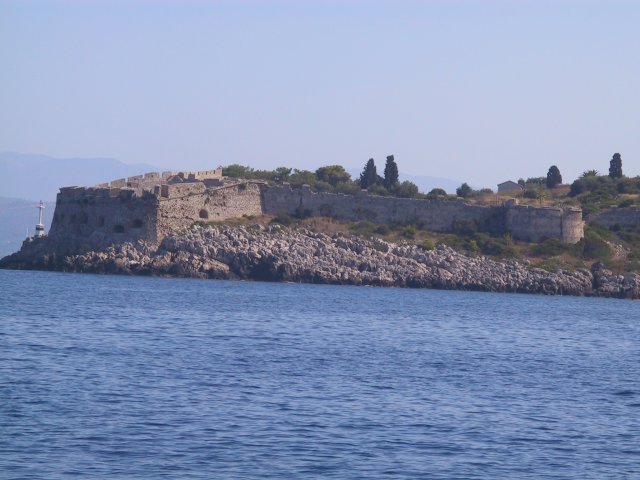Pilos and the Battle of Navarinon
 Pilos was largely built by the French in the 19th century after the Battle of Navarinon and it shows with elegant buildings arranged around a large square. The shaded square has a memorial to the three admirals who commanded the fleet which destroyed Turkish sea power – Admirals Codrington, de Rigny and von Heyden.
Pilos was largely built by the French in the 19th century after the Battle of Navarinon and it shows with elegant buildings arranged around a large square. The shaded square has a memorial to the three admirals who commanded the fleet which destroyed Turkish sea power – Admirals Codrington, de Rigny and von Heyden.
In the evening the locals wander around the square and everyone chooses the cafe of choice and relaxes as the sun goes down - you could almost be in some provincial French town.
 The fort to the W of the harbour, so prominent from seawards, was originally built by the Venetians and added to by the Turks. It has an impressive mosque, now a church, inside the walls.
The fort to the W of the harbour, so prominent from seawards, was originally built by the Venetians and added to by the Turks. It has an impressive mosque, now a church, inside the walls.
The Battle of Navarinon.
At the very time when the Greek forces were at their lowest ebb during the War of Independence, the fortuitous naval engagement in the Bay of Navarinon changed the whole order of things and effectively won the war. On 6 July 1827, the Treaty of London between Great Britain, France and Russia provided that Greece should be autonomous but under the control of the Turks. This piece of legal chicanery was implemented so that the three powers might remain friendly to both Greece and Turkey and allowed for their fleets to guarantee the treaty. The senior admiral, Codrington, was given wide powers of discretion in the policing of the treaty.
 Presented with the terms of the treaty, the Greeks agreed (they had little option) while the Turks did not. Codrington decided to enter the Bay of Navarinon where the Turko-Egyptian fleet was assembled, even though his fleet was outnumbered and outgunned (the allied fleet numbered 26 ships and 1270 guns; the Turko-Egyptian fleet numbered 89 warships and 2450 guns) and despite the fact that his country was not at war with the opposing fleet. The Turko-Egyptian fleet was anchored in a three quarter circle facing the entrance, in theory a trap in which ships sailing in would be caught by fire from all sides before they could sail out again. Codrington led his fleet in, the bands playing on the deck and the gun ports half open, and anchored in the middle of the trap. An Egyptian ship fired a shot and the battle began. "The bloody and destructive battle was continued with unabated fury for four hours; and the scene of wreck and devastation which presented itself at its termination was such as has been seldom before witnessed', Codrington wrote in his dispatch.
Presented with the terms of the treaty, the Greeks agreed (they had little option) while the Turks did not. Codrington decided to enter the Bay of Navarinon where the Turko-Egyptian fleet was assembled, even though his fleet was outnumbered and outgunned (the allied fleet numbered 26 ships and 1270 guns; the Turko-Egyptian fleet numbered 89 warships and 2450 guns) and despite the fact that his country was not at war with the opposing fleet. The Turko-Egyptian fleet was anchored in a three quarter circle facing the entrance, in theory a trap in which ships sailing in would be caught by fire from all sides before they could sail out again. Codrington led his fleet in, the bands playing on the deck and the gun ports half open, and anchored in the middle of the trap. An Egyptian ship fired a shot and the battle began. "The bloody and destructive battle was continued with unabated fury for four hours; and the scene of wreck and devastation which presented itself at its termination was such as has been seldom before witnessed', Codrington wrote in his dispatch.
It was an unremitting battle fought at anchor which Codrington won, proving that European gun crews were more efficient in the heat of battle than their eastern counterparts. Codrington was not censured over this action although the English government expressed regret over it. France mopped up any remaining opposition in the Peloponnisos and in the end Greece was free.